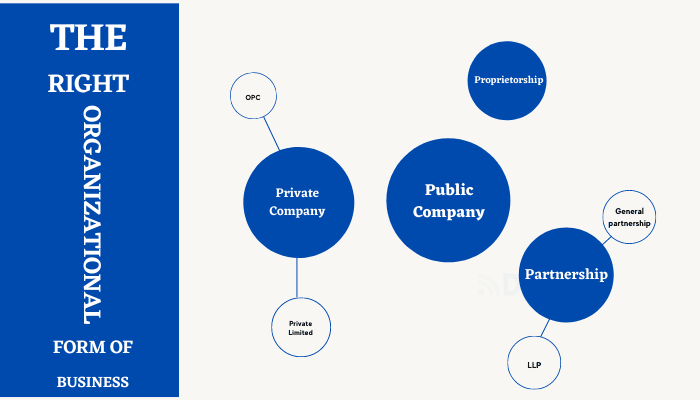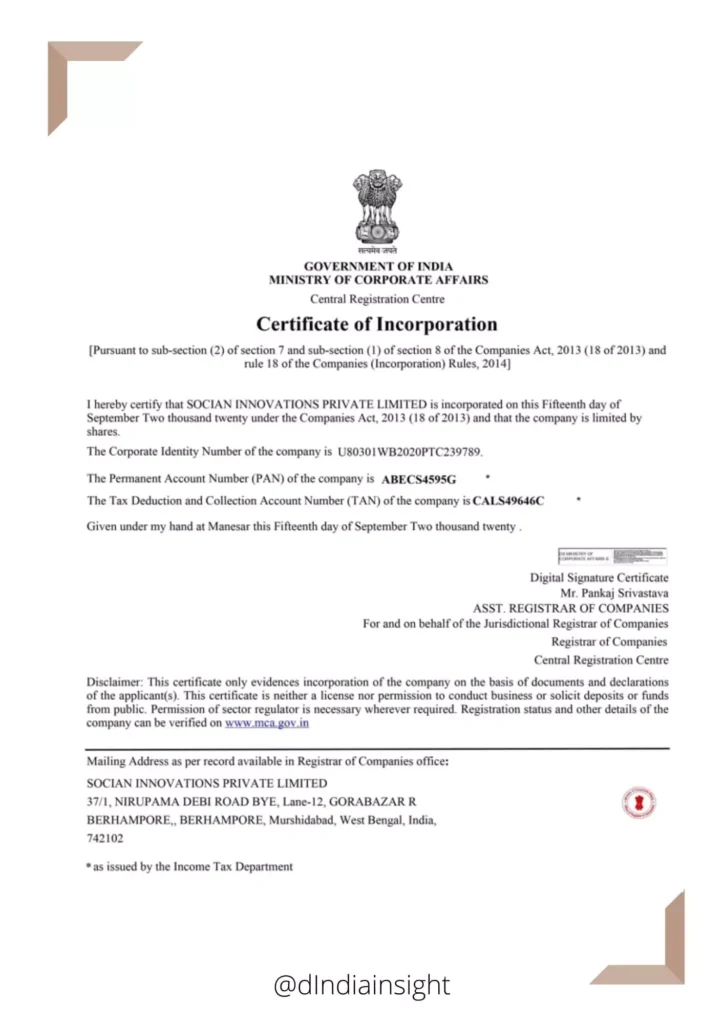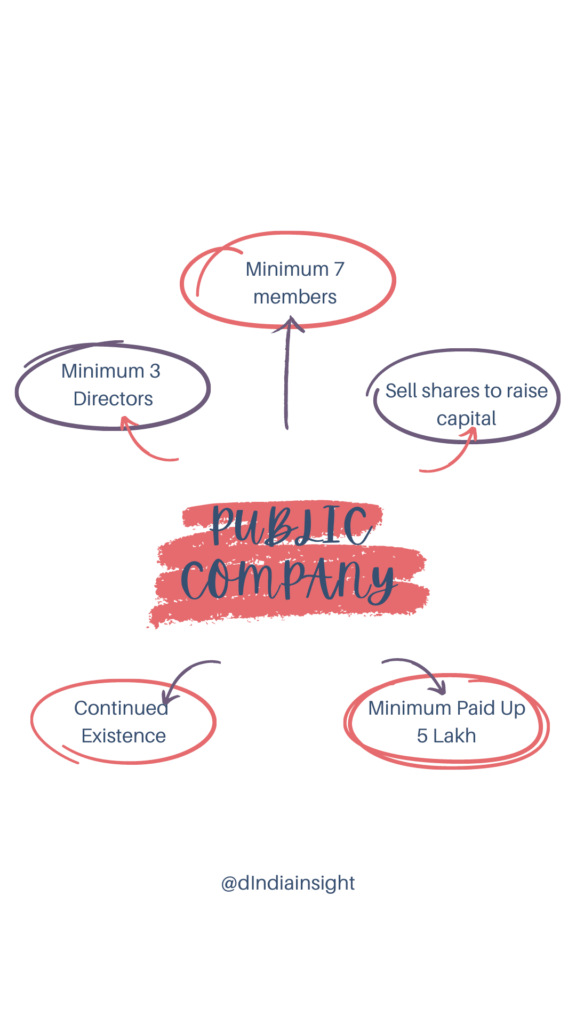There are 6 forms of business organization – Did you select the right one for your business registration?
Sure, you have a luscious business concept cooked up like a hot and ready product, but this will go nowhere if you have to worry about whether you’ve picked the correct legal structure. Selecting the organizational structure will decide the taxes and compliances you must file, the profit you earn, and the liability.
It is not difficult to select which organizational structure is right for your startup if you understand the concept. Here, you will learn about the various forms of structure and gain the ability to decide which one is right for your business type.
I hope you are already running a business or planning to incorporate an idea. If you don’t know what business idea can be suitable and profitable for you, here’s the help. Use the mind mapping technique to visualize your mind and find out the best good idea. Alternatively, you can try the SWOT analysis technique.
Types of Business Organization in India

Here are the 6 most common classifications of business structures in India. However, these six types of business structures in India are private and public organizations. If you are more interested in starting a nonprofit or NGO organization, you can find information on Digital India Insight.
Sole Proprietorship
A sole proprietorship is the first thing that comes to mind when starting a business in India. It is the most simple organizational form of business. The sole proprietorship means a single-owner organization that a sole proprietor owns and is liable for all the debt, decisions, and operations. Unlike other forms of business, your income tax returns will include all the profits, losses, and expenses of the proprietorship business.
The sole proprietorship is most suitable for someone who has planned to start a business with little investment and expects fewer formalities and easy mange. It is associated with obtaining the business licenses as per your state law and business tax registrations like income tax and GST (if required).
Related: Study about the right marketing strategy post-Covid-19
The sole proprietorship is most suitable for someone willing to run the business alone. As a proprietor, you will not be able to take advantage of the Startup India program and raise capital from investors. You will have to be responsible for the complete financial requirement for your business personally. However, there are still ways to raise more money for your sole proprietors like business loans, angel investors, and more.
Sole Proprietorship Features
You have good information about this type of business structure. Let’s look at some sole proprietorship features as well.
- No special registration is required,
- Unlimited liability business structure,
- Single person ownership
- Easy to operate and manage,
- Privacy safe business model since there are no legal formalities for registration,
- No profit-sharing.
Partnership Firm
A partnership firm is an organizational form of business that two or more owners run together. The partners share the profit, loss, business management, decision making, and all the business activities, as per the partnership agreement; also called partnership deed. Each partner agrees to manage the business with their skills and financial support.
As a sole proprietorship firm, the partnership firm and the owners are a single legal entity. Due to this, the partners are liable for unlimited liability. But, you’ll be glad to know that you won’t have to worry about filing countless paperwork or other documentation and taking care of a plethora of legal formalities to manage your partnership business. Apart from ownership, you will have complete control over your business and make all the decisions.
There are two types of partnership. One comes with no liability, and another comes with limited liability; call it LLP (information shared in a paragraph below).

Partnership Firm Features
Guess it, both partnership firm and sole proprietorship have many similarities. Can you tell me three similarities? Let’s find it out with the list of features of the partnership firm.
- Both proprietorship and partnership carry unlimited liability.
- Simple tax structure. The owners are responsible for filing their taxes only rather than filing the tax for their business.
- Unlike limited liability organizations, both proprietorship and partnership firms will be legally operative as long as the owners are alive. The agreement structure maintains legal formalities between the partners.
- It restricts the share transfer to the non-partner person without the involvement of other partners.
Limited Liability Partnership – One of the Forms of Business Organization
Ever wondered if you can take the benefits of limited liability while being a partnership firm? This organizational form of business merges certain benefits of both a partnership firm and a company. So, you get most of the limited liability partnership, popularly known as LLP. A minimum of two partners are required to form an LLP. But, there is no limit to the maximum number of partners.
As you have read, the owners of a general partnership firm are single entities. Unlike partnership and sole proprietorship firms with unlimited liability, the business owners and the LLP are two separate entities. That means; partners in an LLP are separately liable for their reckless actions. The separate legal entity also guarantees that the organization will continue to operate even if all directors pass away.
Features of Limited Liability Partnership
As the name appears, LLP is a hybrid type of business structure. It offers both company and a partnership firm benefits. Let’s understand the main features of a Limited Liability Partnership Firm in India.
- Separate legal body from its partners,
- No restriction on the maximum number of partners,
- Limited liability type of business organization,
- Any business, whether it is a firm or an unlisted company, can be converted into an LLP,
- Unlimited maximum number of partners,
- Easy to wind up,
- Simple compliances law; no board meeting.
Private Limited Company
A private limited company is another flexible type of company structure after LLP. Small business individuals with big plans choose a private limited company for their organizational form of business. A minimum of 2 and a maximum of 15 directors are required in the case of a private company.
However, share trading with the public is not possible on the stock exchange. So, if you have a private limited company; you want to raise capital, you will have to look around. Right, there is always one door open. The members of the company and your family are only investors in your private company.
Such forms of business organization have the limited liability feature; I have discussed this in the LLP section. If you have skipped the part ( naughty you), let’s talk about it a little. The private company offers a limited liability structure to its members’ obligations. That means the liability of the members is limited.
Did I say the same thing? Not confusing you; the liability of the members is limited so, the personal assets of all the shareholders will not be at risk if the company faces a hard time. You will be responsible for paying debt with your shares as drafted in the Memorandum of Association (MOA). Also, being a single legal entity, such a company can have its legal formalities, property on its name, and much more.

Private Limited Company Features
- Limited liability structure,
- No restriction on a minimum paid-up capital,
- A minimum of two shareholders are required; the maximum can be up to 200.
- Separate legal body from its directors,
- When you incorporate a private limited company, it becomes necessary to use the word Pvt. Ltd. in your business name.
- Simple process to transfer the ownership of the company,
- The organizational form of business with a limited liability structure comes with perpetual succession.
One Person Company
A one-person company (OPC) is a type of private company. It carries the same benefits as a private company. The legal formalities of a one-person company are similar to a private limited company in India. Yes, like a private limited company, an OPC will give an entrepreneur limited liability benefits while being a separate legal entity. However, there are some distinctions in ROC filing compliances.
As the name implies, the number of directors in an OPC is allowed to be one with one nominee. There’s no maximum number of directors for one personal company.
Because a sole proprietorship is not a separate entity and carries limitless responsibility, an OPC is the preferred organizational form of business in India if you are a single-man army trying to establish a private limited corporation.
Features of One-Person Company
A private limited company and a one-person company have many similarities. Specially introduced for entrepreneurs who are single owners of their businesses, they can consider incorporating to OPC organizational form of business. Some features of OPC are:
- Limited liability structure of the company,
- Independent legal body,
- One director and shareholder considered,
- The nominee is mandatory to incorporate an OPC in India,
- No minimum paid-up capital restriction,
- You can use the name as [your business name] (OPC) Private Limited,
- Unlike LLP and Pvt. Ltd., OPC does not follow perpetual succession. However, if the nominee decides to become the sole owner after the first owner dies, the company will continue to operate.
Public Limited Company – One of the Structures of a Business

Unlike other forms of business organization with limited liability features, a public limited company can trade its shares to the general public to raise capital. You guessed it right since it also comes under the Companies Act 2013; it offers liability protection to its shareholders similar to its cousin types of business organizations, like Private companies and OPCs. The members of a public limited company and the company itself are separate legal entities. Hence, this organizational form of business is a legal personality, so the members are liable for their obligation alone.
A minimum of three directors are necessary to start a public limited company in India, and the maximum number of directors can be fifteen.
If you want to nominate more than 15 directors, you can do it by passing a special resolution at a general meeting. It applies to private corporations, OPCs, and public companies.
Features of Public Limited Company
Below are some features of a public limited company:
- Limited liability of its members,
- Like other limited liability business structures, a public limited company is also a separate legal entity.
- It allows transferring of shares,
- Allows selling its shares to raise capital,
- A minimum of three directors and seven members are required. The company directors are also the members/shareholders; don’t get confused.
- No restriction on minimum paid-up capital,
- It gives your business the last name “{your business name} Limited”,
- Public limited companies sell their shares through NSE, BSE, and more.
